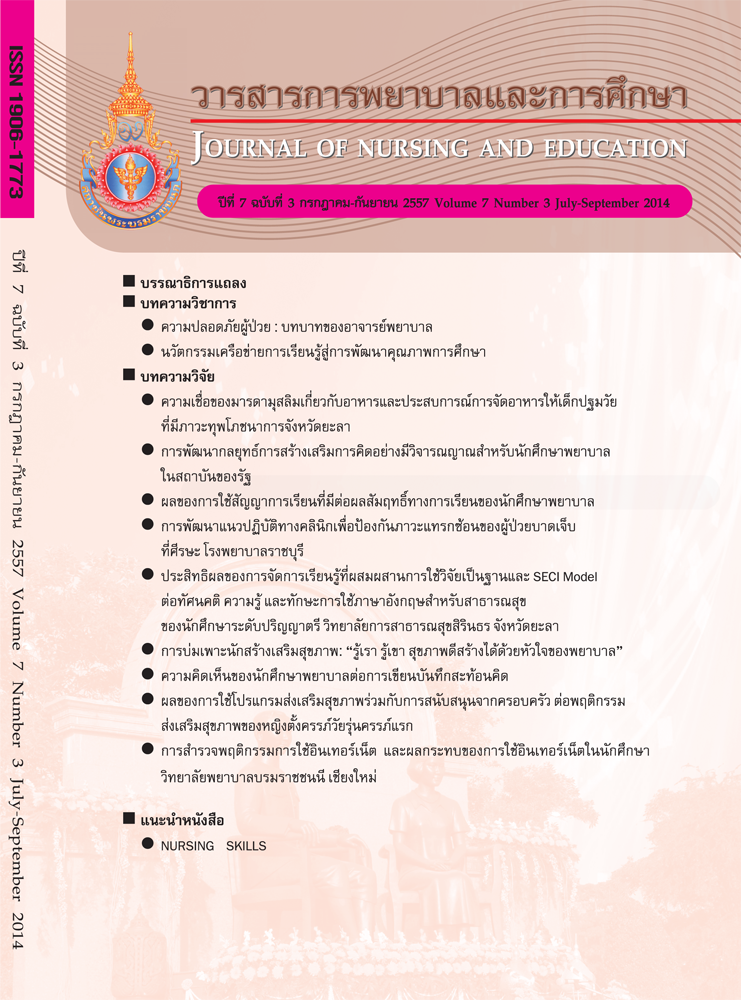ประสิทธิผลของการจัดการเรียนรู้ที่ผสมผสานการใช้วิจัยเป็นฐาน และ SECI Model ต่อทัศนคติ ความรู้ และทักษะการใช้ภาษาอังกฤษ สำหรับสาธารณสุข ของนักศึกษาระดับปริญญาตรี วิทยาลัยการสาธารณสุขสิรินธร จังหวัดยะลา
คำสำคัญ:
การใช้วิจัยเป็นฐาน, SECI Model, ทัศนคติ, ความรู้, การใช้ภาษาอังกฤษ, สาธารณสุข, Research-based Learning, Attitude, Knowledge, English Skills, Public Healthบทคัดย่อ
บทคัดย่อการวิจัยนี้เป็นการวิจัยกึ่งทดลอง (Quasi- experimental Research) แบบกลุ่มเดียววัดผลก่อนและหลัง (One group pre-post test design) เพื่อประเมินประสิทธิผลของการจัดการเรียนรู้ที่ผสมผสานการใช้วิจัยเป็นฐานและ SECI Model โดยมีวัตถุประสงค์เฉพาะ (1) เพื่อเปรียบเทียบทัศนคติต่อการเรียนภาษาอังกฤษสำหรับสาธารณสุขของนักศึกษาก่อนและหลังการจัดการเรียนรู้ที่ผสมผสานการใช้วิจัยเป็นฐาน และ SECI Model (2) เพื่อเปรียบความรู้ภาษาอังกฤษสำหรับสาธารณสุขของนักศึกษาก่อนและหลังการจัดการเรียนรู้ที่ผสมผสานการใช้วิจัยเป็นฐาน และ SECI Model และ (3) เพื่อเปรียบเทียบทักษะการใช้ภาษาอังกฤษสำหรับสาธารณสุขของนักศึกษาหลังการจัดการเรียนรู้ที่ผสมผสานการใช้วิจัยเป็นฐานและ SECI Model กับเกณฑ์มาตรฐาน กลุ่มตัวอย่าง คือ นักศึกษาระดับปริญญาตรีของวิทยาลัยการสาธารณสุขสิรินธร จังหวัดยะลา จำนวน 67 คน การวิเคราะห์ข้อมูลใช้สถิติเชิงพรรณนา สถิติทดสอบค่าเฉลี่ยของประชากร 2 กลุ่มสัมพันธ์กัน (Pair t-test) และ One sample t-test เพื่อทดสอบความแตกต่างระหว่างหลังการจัดการเรียนรู้กับเกณฑ์มาตรฐาน
ผลการศึกษา พบว่า คะแนนเฉลี่ยทัศนคติต่อการเรียนภาษาอังกฤษสำหรับสาธารณสุขของ
นักศึกษา หลังการจัดการเรียนรู้ผสมผสานการใช้วิจัยเป็นฐานและ SECI Model สูงกว่าก่อนจัดการเรียนรู้อย่างมีนัยสำคัญทางสถิติที่ระดับ .05 (หลังเรียน= 3.39, S.D. = 0.20 และก่อนเรียน = 3.29, S.D. = 0.22) คะแนนเฉลี่ยความรู้ภาษาอังกฤษสำหรับสาธารณสุขของนักศึกษาหลังการจัดการเรียนรู้ที่ผสมผสานการใช้วิจัยเป็นฐาน และ SECI Model สูงกว่าก่อนการจัดการเรียนรู้อย่างมีนัยสำคัญทางสถิติที่ระดับ .05 (หลังเรียน= 16.38, S.D. = 3.13 และก่อนเรียน= 11.92, S.D. = 3.38) และคะแนนเฉลี่ยทักษะ
การใช้ภาษาอังกฤษสำหรับสาธารณสุขของนักศึกษาสูงกว่าเกณฑ์มาตรฐาน (ร้อยละ 80) อย่างมีนัยสำคัญทางสถิติที่ระดับ .05
สรุปได้ว่าการจัดการเรียนรู้ที่ผสมผสานการใช้วิจัยเป็นฐานและ SECI Model ในรายวิชาภาษาอังกฤษสำหรับสาธารณสุข ของนักศึกษาระดับปริญญาตรี สามารถปรับเปลี่ยนทัศนคติ และเพิ่มความรู้และทักษะการใช้ภาษาอังกฤษสำหรับสาธารณสุขของนักศึกษาระดับปริญญาตรีได้อย่างชัดเจน จึงควรขยายผลในการจัดการเรียนรู้ที่ผสมผสานการใช้วิจัยเป็นฐานและ SECI Model ต่อไป
คำสำคัญ : การใช้วิจัยเป็นฐาน SECI Model ทัศนคติ ความรู้ การใช้ภาษาอังกฤษ สาธารณสุข
Abstract
This quasi-experimental research, “one group pre-post test design”, aimed to evaluate
effectiveness of using research-based learning integrated with SECI Model. The specific aims were (1) to compare attitude towards learning English for Public Health among undergraduate students before and after education intervention, (2) to compare undergraduate students’ knowledge on English for Public Health before and after education intervention, and (3) to compare undergraduate students’ communication skills in English for Public Health after education intervention and standard criteria (80%). Samples were 67 undergraduate students of Sirindhorn College of Public Health, Yala.
Descriptive statistics were used for analysis in this study. Pair t-test was used to compare the
differences before and after the intervention and the one sample t-test was used to compare the
difference after the intervention and standard criteria.
The results found that mean score of attitude toward learning in English for Public Health after education intervention was statistically significant higher than that mean score before education
intervention at p-value < .05 ( after: = 3.39, S.D. = 0.20 and before: = 3.29, S.D. = 0.22). Mean score of knowledge on English for Public Health after education intervention was statistically
significant higher than that mean score before education intervention at p-value < .05 (after : = 16.38, S.D. = 3.13 and before: = 11.92, S.D. = 3.38) and mean score of communication skills in English for Public Health after intervention was also statistically significant higher than that standard criteria at
p-value < .05 (80%).
Conclusion: after the intervention, all of the students had significant improvements in
attitude, knowledge, and communication skills about English for Public Health, indicating that
research-based learning integrated SECI Model increased the undergraduate students’ knowledge and communication skills significantly and changed their attitudes positively. Thus, research-based
learning integrated SECI Model among undergraduate students must be continuously conducted.
Keywords : Research-based Learning, SECI Model, Attitude, Knowledge, English Skills, Public Health






